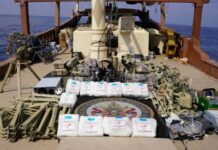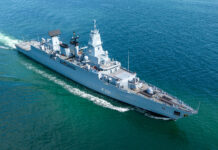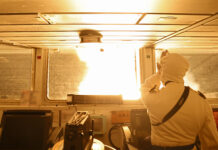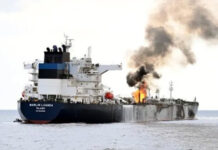The Yemen-based Houthi militia launched a “complex attack using Iranian-designed one-way attack uncrewed aerial vehicles [UAVs], maritime homing and cruise missiles” at maritime traffic in the Red Sea, according to reports from US Central Command on X (formerly Twitter) on 9 January 2024.
The 9 January attack was the largest attack yet on Red Sea shipping and the 26th such assault on commercial shipping in the region since 19 November 2023, when the Houthis began their response to Israeli actions in Gaza, but did not cause any significant damage.
Eighteen UAVs, two cruise missiles and one ballistic missile were shot down by US Navy and Royal Navy assets. F/A-18 fighters from the aircraft carrier USS Dwight D Eisenhower (CVN 69) and four surface vessels, including the Royal Navy destroyer HMS Diamond, were involved in the counter-attack.
Houthis demand retaliation
In a statement published on the internet on 10 January 2024 the Houthis declared that the attack was aimed at a US ship. It is not clear from translations of the Arabic text whether this refers to a US warship or a civilian merchant ship. What is clear is that the Houthis are seeking retribution for the deaths of 10 Yemeni fighters; on 31 December 2023 the first open clash between the patrolling US Navy and the Houthi militia took place, during which the occupants of three Houthi boats were killed in an exchange of fire with US helicopters responding to the call for help from the container ship Maersk Hangzhou.
Regardless of this, the Houthis are repeating their demand for an end to Israeli hostilities in Gaza. Most recently in a message posted online on 8 January, the Houthis declared, “As long as the bombardment of Gaza and the siege continue, all calculations against Zionism are justified.”
In contrast, on 3 January 2024, a coalition of Western-oriented nations issued a joint statement condemning the Houthi actions against international shipping in the Red Sea. The governments of Australia, Bahrain, Belgium, Denmark, Germany, Italy, Japan, Canada, the Netherlands, New Zealand, Singapore, South Korea, the United Kingdom and the United States threatened consequences if the Houthi attacks continued, without specifying what their response would be. Sanaa responded with an bomb-laden unmanned surface vessel that detonated near ships without causing any damage, although it is still unclear whether this was an accidental explosion or a targeted warning from the Houthis.
The deployment of a bomb-laden UAV like the one used on 4 January is a not insignificant change in the situation. Tactically, it requires increased surveillance, whereby precautionary measures are complex in view of the increasingly saturated maritime operational picture in the region. On the other hand, the threat posed by the attack on 9 January, using at least 21 airborne projectiles, should not be underestimated either. Their downing can be seen as a testimony to the effectiveness of the Western military presence in the region and the efficiency of the defence systems deployed by the US-led Operation ‘Prosperity Guardian’ in conjunction with other allied assets. On the other hand, such successes are fragile. They require not only sufficient intervention resources but also a high level of co-ordination, especially when there are a large number of targets. Factors such as mental stress, mental responsiveness and fatigue must also be taken into account.
The actions of 9 January 2024 are the second attack after the declaration of the 14 governments, although even prior to that it seemed doubtful that the Houthis would be impressed by the prospect of being held accountable. While the Houthis’ self-confidence may have been at least slightly dampened by the determined and effective response to their largest attack, this might not account for much, as they have managed to hold their own against the international community and Saudi Arabia since 2015. The Houthis do not operate according to a value-based order and do not function according to Western concepts of liberal behaviour. Their aversion to the West and in particular to the United States, which they perceive as the leading power, meets with a deep hatred of Israel and its supporters.
The Houthis also know they have the backing of Tehran. In addition to political support, Iran is committed to supporting the Houthis financially and with war materiel. It will take thus more than mere diplomacy to unravel these motivational structures.

When will Berlin get involved?
While other nations take action, Germany, despite its economic position, is exercising restraint and ambivalence, although Berlin has been examining participation in Operation ‘Prosperity Guardian’ since at least 15 December 2023. In contrast, the New York Times has reported on London and Washington’s consideration of operations to counter the Houthis, including air strikes and the deployment of special forces.
However, a report published by Reuters on 9 January suggests there may be some movement in Germany’s intransigence. In it, German industry calls on Berlin to provide military support to help make the Red Sea safe for commercial shipping. Wolfgang Niedermark, an executive board member of the Federation of German Industries (BDI), stated in an email to Reuters: “The German government must now take responsibility without further hesitation and, together with its allies, take the necessary steps to protect the currently threatened sea routes in the Suez Canal and the Red Sea against the ongoing attacks, including militarily. … Germany must take an active leadership role as the third strongest trading nation in the world.
“Securing maritime trade routes is not only in the interests of the German economy, it is a fundamental component of our national security,” Niedermark added.
Implicitly, the question arises under which mandate German participation could take place. With the exception of Copenhagen and London, European capitals are currently finding it difficult to place units under US command. The question of how Germany will position itself if a coalition or NATO warship is involved in military action or even hit is also becoming virulent.
“The Federal Ministry of Defence is examining possible participation in the US-led mission,” a spokeswoman said.













